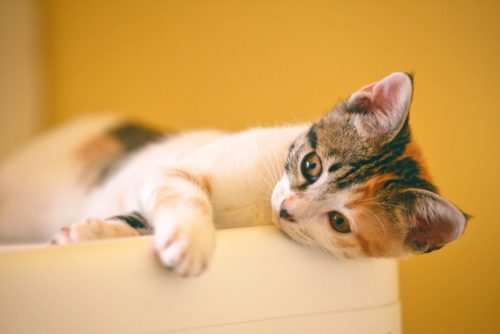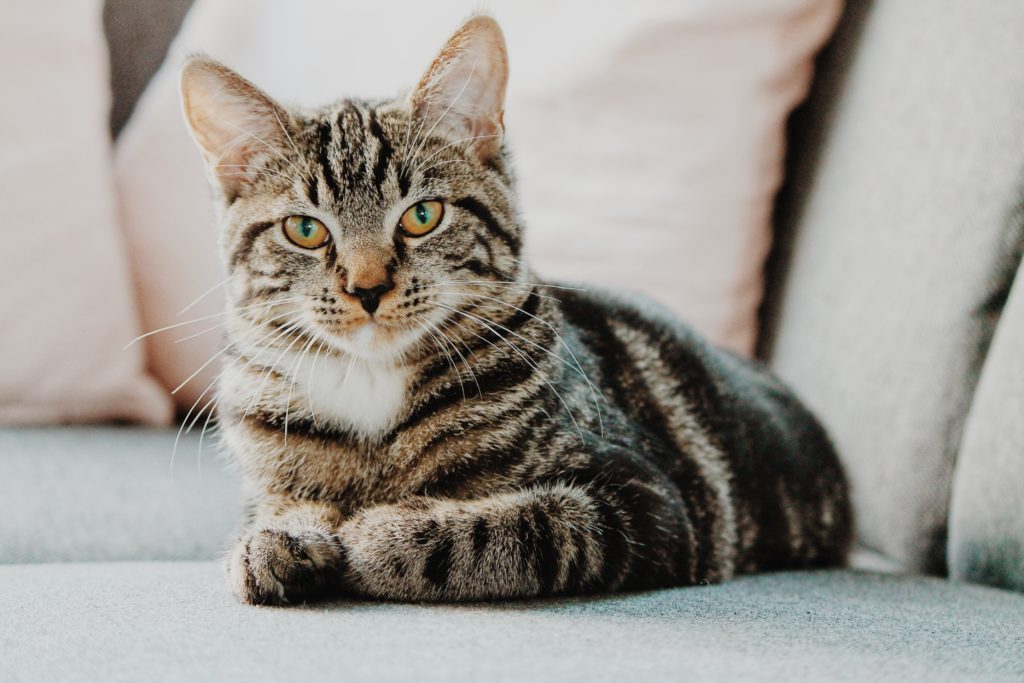There are a few things to avoid feeding your cat, such as anything with caffeine or chocolate, but you may wonder: can cats eat cheese? The answer: yes and no. On one hand, some cats enjoy cheese and it is a source of vitamin D. Even then, it’s best to give them only small amounts. On the side, since cheese contains dairy, it can cause digestion issues for your cat. Not only that, cheese can cause allergic reactions in cats as well.
Like humans, some cats can be lactose-intolerant, which makes it harder for them to process dairy. Lactose-intolerance causes symptoms like feline vomiting and diarrhea. It may also make your cat have a loss of appetite or feel lethargic. Then, what seems like a harmless little snack can wreak havoc on your pet’s stomach.
If you decide to give your cat milk or cheese, try one small piece at a time to test how he reacts. Look out for any possible side effects and when in doubt, check with your veterinarian before adding anything new to your cat’s diet. Even if your cat enjoys and can eat cheese, it doesn’t necessarily mean he should.
Alternatives to Cheese for Cats
There are plenty of other food options to feed your cat beside cheese. Snacks like hard-boiled eggs, liver, or fish are healthy alternatives. Although cheese may be your cat’s current favorite snack, if it’s causing negative reactions, it’s not worth it. Fortunately, there are also several cheese-flavored cat products that don’t contain dairy to help make your cat’s taste buds happy. In general, though, cats don’t require too many snacks due to their low activity levels. There’s not an ongoing need to refuel their energy. Sticking to a regular meal plan works out fine.
Cat Nutrition Plans
A cat’s age, weight, and breed are factors that will determine what kind of foods should be included in your cat’s meal planning. What your cat likes and needs when they’re kittens will likely change as they grow into adults. For example, milk and cheese may not contribute to cat digestive problems early on, but lactose-intolerance usually appears when they’re into their later years. It’s best to follow an organic diet for your pet with foods that include vitamins A, D, E, and K.
When looking at cat nutrition labels, limit the amount of additives or unusual ingredients that you choose to feed your pet. Nearly all cat food brands include the essential minerals and vitamins needed to maintain your pet’s health. Plus, many incorporate various flavors to make packaged food more appealing. There’s a range of options including chicken-flavored, fish-flavored, and yes, cheddar cheese snacks. Since breaking down milk enzymes may be hard on your cat, avoid giving him straight cheese and go for a replacement instead.
Rather than giving snacks as treats for good behavior or as part of a daily diet, give your cat a toy to play with or introduce a new area to explore. Every cat has different needs at different stages of life. Adjust snacks, meals, and playtime accordingly.
How Often Should My Cat Eat Snacks?
If you’re unsure about how much you should feed your cat per day, ask your veterinarian for recommendations as part of a healthy growth plan. As your cat gets older, there will be changes in nutrition requirements. For example, if your pet is overweight or suffers from cat obesity, that will affect the kind of food and how often it should eat to help with weight loss. Extra weight is hard on your cat’s bones and body. A diet adjustment can help your cat slim down while still getting the nutrients he needs.
A Healthy Pet Is a Happy One
Every pet owner wants to make sure their cat is taken care of in all aspects, but they can’t be monitored all day every day. Don’t fret if your cat has consumed cheese. Any side effects aren’t long-term and aren’t toxic. Notice changes in diet and let anyone who cares for your pet know the restrictions. It’s important that once you find a food schedule that works to maintain it as much as possible.
Cats are carnivores, a meat-based diet helps to avoid protein and vitamin deficiencies. It is good for their physical appearance but also for their internal health, especially muscle development and feline heart disease prevention. Many canned cat foods have a specialized mix of what your cat needs to be healthy. If you’re a new pet owner, read labels and consumer reviews until you find what works best.
In addition to following a good nutrition plan, provide your cat with plenty of water, love, and attention. They need these things just as much as a sensible diet. Plus, any pet owner who has more than one cat understands that the routine isn’t necessarily identical for each. Cats have individual preferences, food aversions, health issues, and growth plans. However, among these differences, the one thing it all comes down to is keeping pets healthy and happy. Once in a while, that might mean giving them a little cheese.
Sources:
“Feline Diet and Nutrition.” Tree House Humane Society, www.treehouseanimals.org/site/PageServer?pagename=caring_health_veterinary_feline_nutrition.
Lowrey, Sassafras. “Can Cats Eat Cheese? Get the Facts About Cats and Cheese.” Catster, 21 Sept. 2018, www.catster.com/cat-food/can-cats-eat-cheese.
Rydahl, Arvid. “Why Cheese Is Not Safe for Cats.” All Pet Magazine, 20 Dec. 2018, allpetmagazine.com/can-cats-eat-cheese/.




